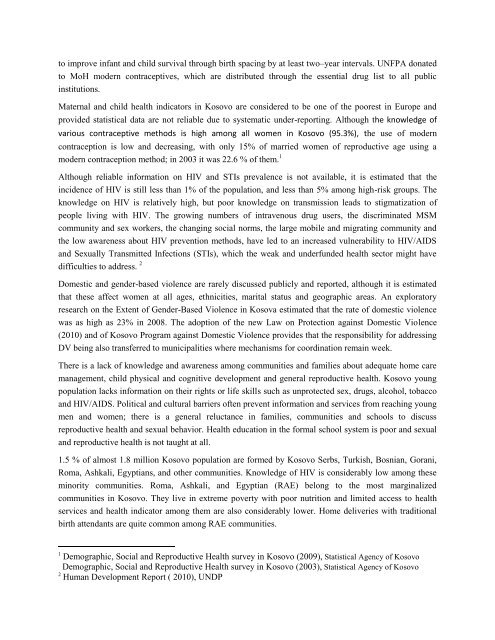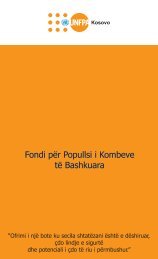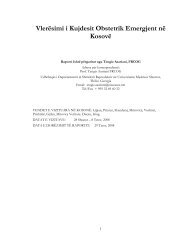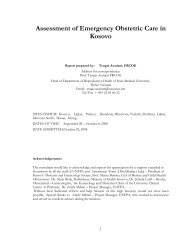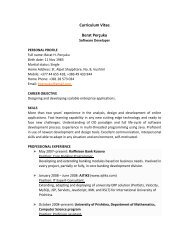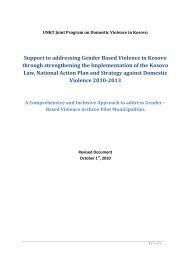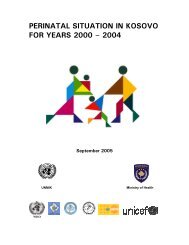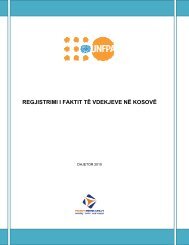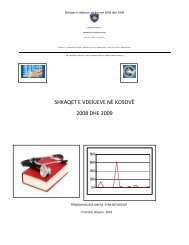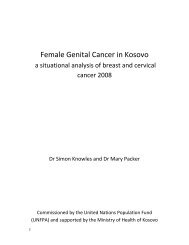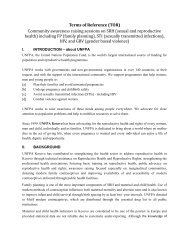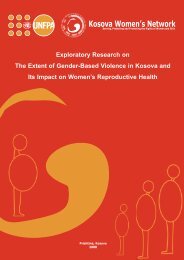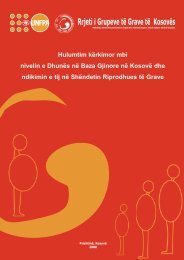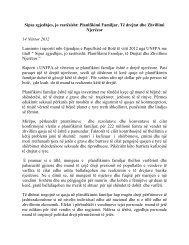Terms of Reference (TOR) Community awareness raising ... - UNFPA
Terms of Reference (TOR) Community awareness raising ... - UNFPA
Terms of Reference (TOR) Community awareness raising ... - UNFPA
Create successful ePaper yourself
Turn your PDF publications into a flip-book with our unique Google optimized e-Paper software.
to improve infant and child survival through birth spacing by at least two–year intervals. <strong>UNFPA</strong> donated<br />
to MoH modern contraceptives, which are distributed through the essential drug list to all public<br />
institutions.<br />
Maternal and child health indicators in Kosovo are considered to be one <strong>of</strong> the poorest in Europe and<br />
provided statistical data are not reliable due to systematic under-reporting. Although the knowledge <strong>of</strong><br />
various contraceptive methods is high among all women in Kosovo (95.3%), the use <strong>of</strong> modern<br />
contraception is low and decreasing, with only 15% <strong>of</strong> married women <strong>of</strong> reproductive age using a<br />
modern contraception method; in 2003 it was 22.6 % <strong>of</strong> them. 1<br />
Although reliable information on HIV and STIs prevalence is not available, it is estimated that the<br />
incidence <strong>of</strong> HIV is still less than 1% <strong>of</strong> the population, and less than 5% among high-risk groups. The<br />
knowledge on HIV is relatively high, but poor knowledge on transmission leads to stigmatization <strong>of</strong><br />
people living with HIV. The growing numbers <strong>of</strong> intravenous drug users, the discriminated MSM<br />
community and sex workers, the changing social norms, the large mobile and migrating community and<br />
the low <strong>awareness</strong> about HIV prevention methods, have led to an increased vulnerability to HIV/AIDS<br />
and Sexually Transmitted Infections (STIs), which the weak and underfunded health sector might have<br />
difficulties to address. 2<br />
Domestic and gender-based violence are rarely discussed publicly and reported, although it is estimated<br />
that these affect women at all ages, ethnicities, marital status and geographic areas. An exploratory<br />
research on the Extent <strong>of</strong> Gender-Based Violence in Kosova estimated that the rate <strong>of</strong> domestic violence<br />
was as high as 23% in 2008. The adoption <strong>of</strong> the new Law on Protection against Domestic Violence<br />
(2010) and <strong>of</strong> Kosovo Program against Domestic Violence provides that the responsibility for addressing<br />
DV being also transferred to municipalities where mechanisms for coordination remain week.<br />
There is a lack <strong>of</strong> knowledge and <strong>awareness</strong> among communities and families about adequate home care<br />
management, child physical and cognitive development and general reproductive health. Kosovo young<br />
population lacks information on their rights or life skills such as unprotected sex, drugs, alcohol, tobacco<br />
and HIV/AIDS. Political and cultural barriers <strong>of</strong>ten prevent information and services from reaching young<br />
men and women; there is a general reluctance in families, communities and schools to discuss<br />
reproductive health and sexual behavior. Health education in the formal school system is poor and sexual<br />
and reproductive health is not taught at all.<br />
1.5 % <strong>of</strong> almost 1.8 million Kosovo population are formed by Kosovo Serbs, Turkish, Bosnian, Gorani,<br />
Roma, Ashkali, Egyptians, and other communities. Knowledge <strong>of</strong> HIV is considerably low among these<br />
minority communities. Roma, Ashkali, and Egyptian (RAE) belong to the most marginalized<br />
communities in Kosovo. They live in extreme poverty with poor nutrition and limited access to health<br />
services and health indicator among them are also considerably lower. Home deliveries with traditional<br />
birth attendants are quite common among RAE communities.<br />
1<br />
Demographic, Social and Reproductive Health survey in Kosovo (2009), Statistical Agency <strong>of</strong> Kosovo<br />
Demographic, Social and Reproductive Health survey in Kosovo (2003), Statistical Agency <strong>of</strong> Kosovo<br />
2 Human Development Report ( 2010), UNDP


